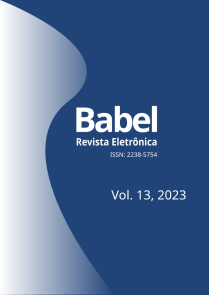Cognitive strategies in the linguistic production in English
DOI:
https://doi.org/10.69969/revistababel.v13i.17954Keywords:
Linguistic production, Psychological factors, Cognitive strategiesAbstract
The linguistic production in a foreign language in academic contexts can be a difficult activity for learners due to some external and internal factors, like psychological factors; that may cause interference in the linguistic production (GOMES, 2018). Considering these factors, it is possible to use cognitive strategies to help to deal with difficulties in the oral and written production (OXFORD, 1990). In this context, this study tries to identify and describe the psychological factors that interfere the oral and written production of the freshman students in the course of Letters and map the cognitive strategies used to deal with the difficulties in the mentioned context. To carry out this research, a questionnaire was applied to ten freshman students of Letters – English Language at UFCG. After analyzing the results, it was possible to identify that anxiety, fear, pressure, shyness, tension, nervousness, and lack of motivation were the factors mentioned as obstacles in the linguistic production in academic activities. As a result, to deal with those factors, the strategies of practicing, repetition, annotation, reading and listening to contents in the foreign language worked as facilitators in this process. Finally, using the mentioned strategies can help to deal with psychological factors that block the oral and written production.
Downloads
References
AIDA, Yukie. Examination of Horwitz, Horwitz, and Cope's Construct of Foreign Language Anxiety: The Case of Students of Japanese. The Modern Language Journal v. 78 n. 2, p. 155-168, 1994. Disponível em: <https://doi.org/10.2307/329005> Acesso em: 15 mai. 2023.
ATTIR, Khadidja. Investigating the Main Psychological Factors Affecting Learners’ Speaking Performance. Case Study: Second Year Students of English at Briska University. Dissertation (Master Degree in Sciences of Language) – Faculty of Letters and Language, University of Briska. Algeria, p. 82. 2016.
BEKLEYE, Niüfer. The Influence of Teachers and Peers on Foreign Language Classroom Anxiety. In: Dil Dergisi · January 2004. Disponível em: <https://www.researchgate.net/publication/270547258_THE_INFLUENCE_OF_TEACHERS_AND_PEERS_ON_FOREIGN_LANGUAGE_CLASSROOM_ANXIETY_OGRETMEN_VE_SINIF_ARKADASLARININ_YABANCI_DIL_SINIF_KAYGISI_UZERINDEKI_ETKILERI>. Acesso em: 17 Abr. 2023.
CHAMOT, Anna Uhl. Cognitive instructions in the second language classroom: the role of learning strategies. In: Georgetown University Round Table on Languages and Linguistics 1990. Washington, D.C.: Georgetown University Press, 1990. p. 496-513.
COUNCIL OF EUROPE. Common European Framework of Reference for Languages: Learning, teaching, assessment – Companion volume, Council of Europe Publishing, Strasbourg, 2020. Disponível em: www.coe.int/lang-cefr. Acesso em: 26 mai. 2023.
DIVITIIS, Gleice de. Inglês nas escolas regulares brasileiras: adequações metodológicas para a eficácia do ensino e aprendizagem. SILEL, vol. 3, nº 1, Uberlandia, 2013.
DUERAMAN, Bayatee. Teaching EFL writing: Understanding and Rethinking the Thai Experience. In: Journal of Alternative Perspective in the Social Sciences, vol. 4, nº 1, 2012.
EZZIR, Nemah A. A. The Relationship Between Learner Autonomy and English Proficiency of Yemeni Postgraduate English Students: A Correlational Study in Hodeidah University. Journal of Education and Practices, Yemen, v. 9, n. 6, p. 80-89, 2018. Disponível em: <https://www.researchgate.net/publication/353908884_The_Relationship_Between_Learner_Autonomy_and_English_Proficiency_of_Yemeni_Postgraduate_English_Students_A_Correlational_Study_in_Hodeidah_University> Acesso em: 12 abr. 2023.
FERREIRA, Mariana X. A relevância como gatilho pragmático da motivação na aquisição de línguas adicionais. Dissertação (Pós - Graduação em Letras) – Setor de Ciências Humanas, Letras e Artes, Universidade Federal do Paraná, Brasil, p. 114. 2017. Disponível em: <https://acervodigital.ufpr.br/handle/1884/54880?show=full> Acesso em: 06 jun. 2023.
HENTER, Ramona. Affective factors involved in learning a foreign language. In: Procedia – Social and Behavioral Sciences, 127, p. 373 - 378. 2014.
GOMES, Manoel M. Fatores que facilitam e dificultam a aprendizagem. Revista Educação Pública. 2018.
JALO, Marcela, L. Language learning strategies. Cuadernos de Lenguas Modernas, vol. 5, nº 5, p. 155-244. 2005. Disponível em: <https://www.memoria.fahce.unlp.edu.ar/art_revistas/pr.3540/pr.3540.pdf> Acesso em: 21 nov. 2023.
MENN, Lise; DRONKERS, Nina. Psycholinguistics: introduction and applications. Second Edition. San Diego, CA, 2017.
OXFORD, Rebecca. Language Learning Strategies: What every Teacher Should know. Boston, Mass. Heinle & Heinle Publishers, 1990.
PEREIRA, A. M. F.; FERNANDES, S. C. S.; BITTENCOURT, I. I.; FÊLIX, A. Teoria do fluxo e aprendizagem no contexto brasileiro. Educ. Pesqui, São Paulo, v. 48, p. 1-20, 2022. Disponível em: <https://www.researchgate.net/publication/359999306_Teoria_do_fluxo_e_aprendizagem_no_contexto_brasileiro_uma_revisao_sistematica_de_literatura> Acesso em: 04 jun. 2023.
STRAKOVA, Zuzana. Developing Cognitive Strategies in Foreign Language Education. In: Journal of Language and Cultural Education 1, p. 37-45. January, 2013.
WELP, Anamaria K. de Souza. A ansiedade e o aprendizado de língua estrangeira. Letras de Hoje, Porto Alegre, v. 44, n. 3, p. 70-77, jul./set. 2009. Disponível em: <https://revistaseletronicas.pucrs.br/ojs/index.php/fale/article/view/5766> Acesso em: 04 mai. 2023.
Published
How to Cite
Issue
Section
License
Copyright (c) 2023 Babel: Revista Eletrônica de Línguas e Literaturas Estrangeiras

This work is licensed under a Creative Commons Attribution-ShareAlike 4.0 International License.
Os autores detém os direitos autorais sem restrições, porém ao submeter os originais, concordam em transferir a este periódico os direitos da primeira publicação. Isto deve ser informado em caso de nova edição do texto. As produções que derivarem deste material, devem obrigatoriamente citar a fonte. Os textos publicados nesta revista, salvo indicações contrárias, encontram-se sob uma licença Creative Commons Atribuição 4.0 Internacional.

